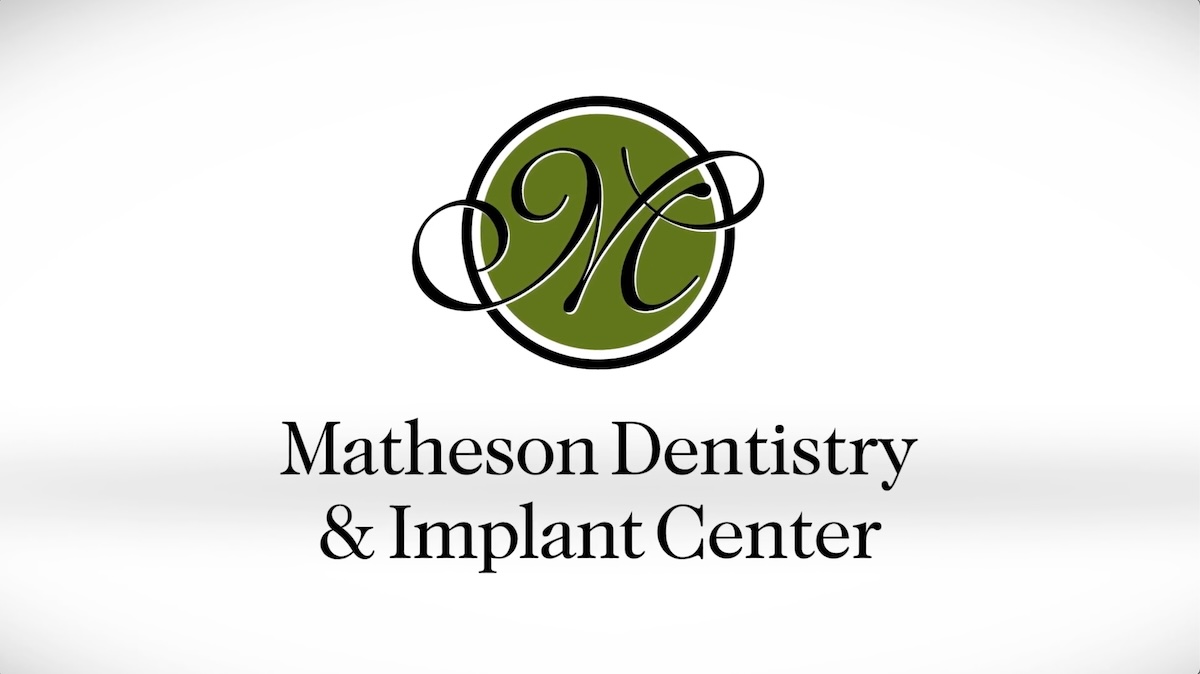Dr. Matheson, what are dental implants?
A dental implant is basically a titanium screw that is placed in the jawbone to replace the tooth roots. This is a larger model of a dental implant. Essentially, it's used to replace missing teeth. When someone is missing a single tooth or multiple teeth, we can place a titanium screw in the jawbone. This screw acts as a foundation for a tooth. To replace a single missing tooth, we place an implant in the jawbone, attach a small metal piece called an abutment, which protrudes through the gums, and then cement a crown or false tooth onto it. That's what an implant is when it comes to replacing a single missing tooth.
What conditions would cause the dentist to recommend dental implants?
There are several conditions that might necessitate a dental implant. One reason is if a tooth has so many cavities that there's not much left and it needs removal. Another reason could be severe gum disease affecting the tooth. Additionally, a significant crack extending down the root might make a tooth unsalvageable, requiring extraction and a dental implant.
What are the advantages of dental implants?
Dental implants have several advantages over other tooth replacement methods. They are superior to partial dentures, which are removable, require soaking at night, and can be uncomfortable. A dental implant looks, feels, and functions just like a natural tooth, making it a preferable option.
What is the process I will go through if I decide to get dental implants?
The process begins with a thorough examination of your mouth, bone, gums, and adjacent teeth. We will take a CT or CAT scan to see your jaw in 3D and ensure you're a suitable candidate for an implant. We also review your medical history, as most people can receive dental implants unless certain medical conditions or medications play a role in the process.
What are the steps in the process of placing a dental implant?
The steps include removing an existing tooth if necessary, using local anesthesia or sedation. After tooth extraction, we prepare the site for the implant, possibly adding a bone graft if needed. The implant integrates into the bone over three to five months. Once integrated, we take a digital impression for the lab to create the abutment and crown, which is placed about two weeks later.
When would bone grafting be required?
Bone grafting may be needed if there isn't enough bone to surround the dental implant. The graft can come from the patient's body or a cadaver source. It's similar to materials used in orthopedic surgery, acting as a scaffold for your bone cells to create new bone, eventually becoming your own.
When choosing the artificial teeth, what options do I have and what are the pros and cons of each?
For those without teeth, dental implants were originally designed for them. Options include snap-on teeth that attach to a couple of implants in the jawbone, providing more stability than traditional dentures but still removable. Alternatively, permanent implant teeth require more implants and are screwed in, offering more durability with zirconia material for long-lasting results.
How long does it typically take to recover from dental implants?
Recovery varies among individuals, with most feeling better after four or five days. Some may experience soreness for a week or two, which is normal. We provide pain management to ensure comfort during the recovery period.
How long do dental implants last?
Dental implants can last a long time, depending on how well they are maintained. While they can't develop cavities, gum disease can occur around them. Regular dental visits and proper brushing and flossing are crucial for longevity.
What are the costs and financing options involved with dental implants?
At Matheson Dentistry, we review options with each patient to fit their budget. Various third-party financing options allow payments over multiple years, making implants accessible to many.
Do most insurance plans cover the cost of dental implants?
Insurance coverage varies, with some plans offering partial assistance. We have a conversation with each patient to tailor treatment plans and payment options to their needs, ensuring affordability.
How can I schedule an appointment to talk to a dentist about dental implants?
If you're considering dental implants, call us at 480-888-8123 to schedule a free consultation. We'll discuss various treatment plans and take x-rays at no cost to create a personalized plan for you.
I hope we've answered your questions about dental implants. For further inquiries or to discuss your options, please call us at (480) 888-8123 to schedule a no-cost consultation, where we'll take x-rays and discuss how dental implants can improve your life.
Missing a tooth? How about several teeth? How about all your teeth? Find it hard to chew? Or feel embarrassed when smiling? Are you always conscious about what other people are thinking about your missing tooth? A dental implant is a one-stop solution to all your worries.
A dental implant (a.k.a an endosseous implant or fixture) is a prosthetic tooth root that is surgically placed into your jawbone beneath the gums. A dental implant is more secure than a denture or a conventional bridge.
Why should you choose a dental implant?
The entire structure of a dental implant resembles a natural tooth and is more secure than a denture or a conventional bridge. This is because they fail to account for the fact that real teeth help to “preserve” the jawbone while bridges and dentures fail to do so.
- Fixed or partial bridges: Placing of bridges require removal of a thin layer of material from the adjacent teeth to hold them in place which damages the natural structure of those teeth. These teeth, that hold the bridges together, are also weakened by the chewing forces on the bridges.
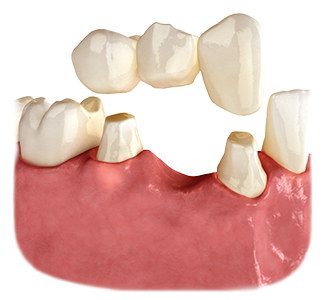
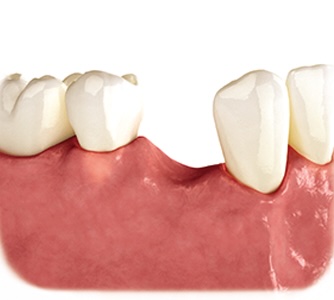
- Dentures: For some patients, partial or full dentures are not comfortable as they can slip and restrict the type of food that you can eat. They also run the risk of soreness, gagging, and causing the remaining jaw bone to atrophy and change the structure of the face.
Types of dental implants
- Single tooth replacement:One implant is used to replace a single tooth. The implant is placed in the spot where the missing tooth root was embedded in the jaw bone. A prosthetic tooth is then attached to the implant. This implant tooth looks and functions like a natural tooth.
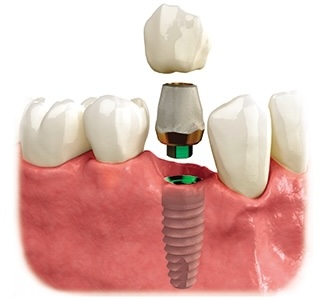
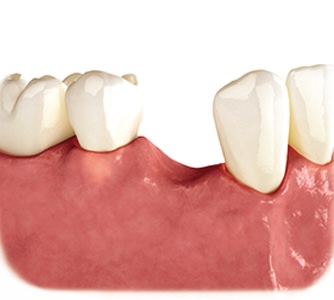
Multiple/all tooth replacement: When several teeth in a row are missing, often two or three implants can be placed and a fixed bridge can replace all the missing teeth. When all the teeth are missing in a jaw, a few implants can be placed and support a removable (or "snap-in") denture, or can even support a fixed (or "fixed-hybrid") denture.
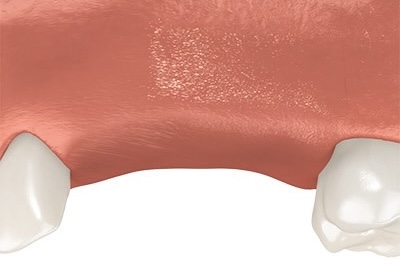
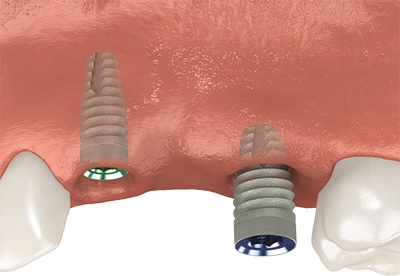
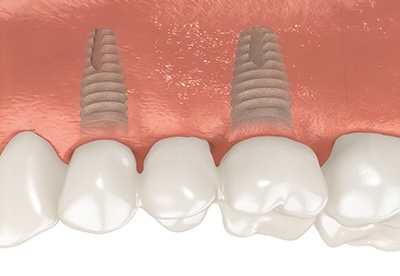
- Sinus augmentation and Ridge modification:The success of an implant largely depends on the quantity and quality of the jawbone. When the bone structure has deformities or is not strong enough to support an implant and an artificial tooth, bone grafting is done by either performing a sinus lift or ridge modification. This means the bone is exposed and developed to ensure that it can support an intended dental implant.
Implant Placement and aftercare
First, the implant is placed surgically into the jaw bone. Once it is in place, the implant fuses with the bone over a few months' time in a process called osseointegration to provide stable support to the artificial tooth or teeth. After this, a dental crown or bridge is placed on top of the implant(s) to mimic the tooth or teeth. The implant and the crown are connected using an "abutment" or a connector. To maintain the longevity of your dental implant, follow these practices:
- Practice proper oral hygiene by regularly brushing and flossing your teeth using a soft-bristle toothbrush and fluoride-rich toothpaste.
- Avoid chewing hard foods, at least in the early periods of getting a dental implant.
- Visit your dentist regularly for consultations to keep an eye on the status and progress of the dental implant.
Get top-quality dental implant treatment done by experts at Matheson Dentistry & Implant Center in Queen Creek, AZ. Call us today!
John's before & Afters
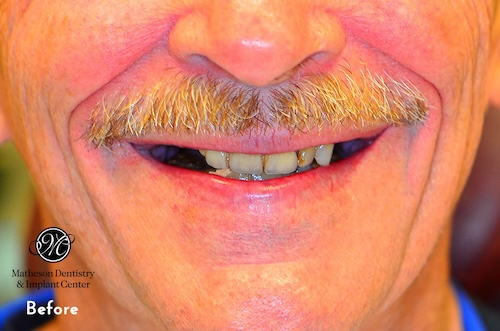
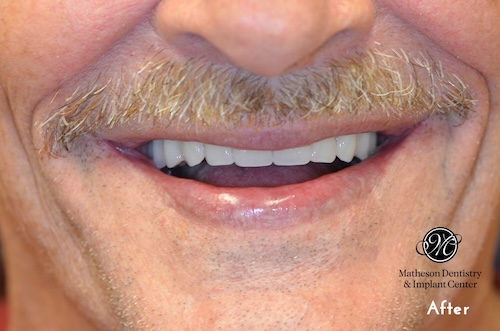
John had suffered from missing teeth for years. He didn’t like the way his smile looked and it was difficult to eat. A fixed denture supported by dental implants changed his smile and his life. He couldn’t be more thrilled with the result. Congratulations John!
Patient Testimonials
Jim was tired of his ill-fitting dentures, but after his Teeth in One Day Procedure he can stop smiling.




